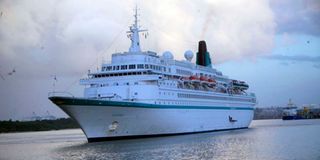Fete our fellow beings risking to serve at sea

The tourist cruise ship Albatros arrives at the Port of Mombasa with 800 tourists in this picture taken on November 3, 2019.
What you need to know:
- Every June 25, the world recognises the invaluable contribution seafarers make to international trade and the world economy.
- Seafarers of all stripes — from coast guards to navies, fisherman, sailor, marine biologist and cruise ship captain — are feted.
The annual international Day of the Seafarer, which is coordinated by the International Maritime Organisation and is being celebrated today, has now been officially added to the United Nations’ list of observance.
Every June 25, the world recognises the invaluable contribution seafarers make to international trade and the world economy, often at great personal cost to themselves and their families. Seafarers of all stripes — from coast guards to navies, fisherman, sailor, marine biologist and cruise ship captain — are feted. If your job involves a large quantity of salt water, then this day is dedicated to you.
A seafarer is any individual employed, engaged or working aboard a ship and who does not exclusively work on board while the vessel is in port. They are employed by a ship owner to do ship service at sea — taking part in the ship’s operation and maintenance and the provisioning of those on board.
Since many centuries ago, global trade still depends on ocean transport. Over 90 per cent of global trade is done by sea since it is still the most cost-effective way to transport goods. Marine biologists and oceanographers from every country have dedicated their lives to learning more about the ocean depths, and humans from every walk of life keep going to the sea to explore the planet.
Not only does trade by sea make up most of the global economy but also the oceans take up about 70 per cent of the planet. Over a million species of plants and animals live in the ocean and scientists such as oceanographers and marine biologists estimate that there are up to nine million more.
Sea-related courses
Navies secure us during wars and coast guards keep us safe from natural disasters, criminals and environmental deterioration. The ocean poses a significant threat to life; without these organisations, we could be in even more danger.
In a bid to contain the spread of Covid-19, many governments prohibit seafarers from leaving their ships once docked at the ports. In Mombasa, Mission to Seafarers (MTS) Hotel, through its many alliances worldwide, offers the seafarer a home away from home — an opportunity to communicate with their loved ones and rest and relax. It ensures the spiritual and physical wellbeing of seafarers, as well as assisting them with social justice issue.
Following an agreement between the government and Mediterranean Shipping Company (MSC), more than 500 Kenyan youth had been employed aboard the shipping line’s cruise ships before the outbreak of Covid-19. The government also has a regulatory body in the shipping industry to protect local seafarers from exploitation by multinationals in terms of employment opportunities, wages and working conditions.
The various TVET colleges in Mombasa and other coastal counties should offer sea-related courses such as nautical science and marine engineering, seamanship, coast guard and ferry personnel. That will, obviously, enhance Kenya’s blue economy and create more jobs to the country’s young people.
Ms Onjoro is the director, Careers Organisation. [email protected]





